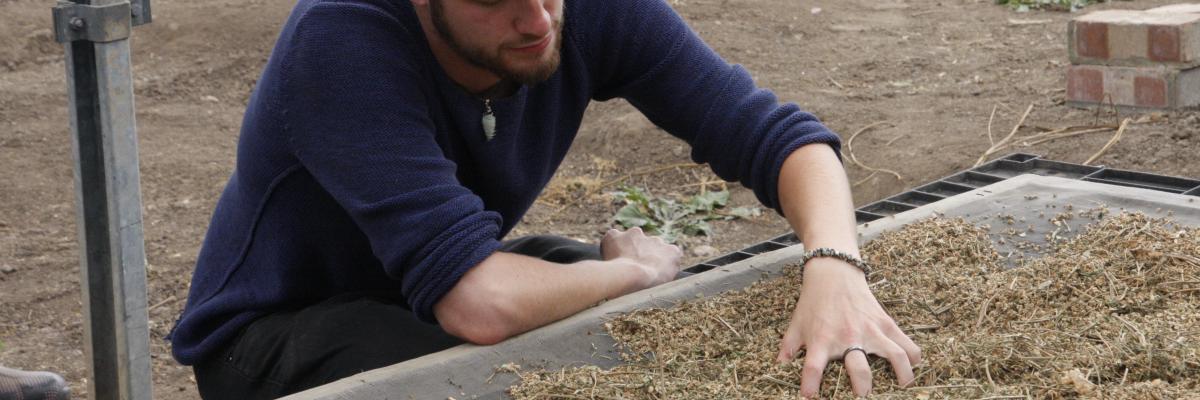
Seeds - our culture and our future
10 October 2018
Cultivating diversity is one way for smaller organic growers, selling directly to the consumer, to differentiate themselves from the uniform offerings of the multiple retailers. Seeds and varieties are part of our cultural heritage and as growers we are custodians of that. The story can be sold along with the produce. But, heritage is also dynamic and feeds and informs the future. I don’t believe that hybrids are ‘evil’, and I think there is a place for them on the market garden - Crown Prince my all-time favourite squash variety is a hybrid. Growers need the best tools for the job, whilst respecting the integrity of the plant. We do, however, need to invest more energy into those neglected open-pollinated varieties to ensure they are fit for purpose, improved and adapted to changing climate and markets, and available for future generations of growers, gardeners and consumers.

It all starts with the seed. As a smaller scale organic grower finding the right varieties for your farm is vitally important. Not only that but the quality has to be good, and in the quantities and format you need. With the loss of independent organic variety trials in the UK since Defra stopped funding the NIAB/Garden Organic trials in 2006, it has become more difficult to find real information about how varieties might perform. UK seed companies no longer have organic demonstration grounds and growers have to head to the Netherlands to Bejo, Rijk Zwaan or Vitalis to see varieties under organic conditions in the flesh. Much of the attention of these breeding companies is on hybrids and the quality, vigour and uniformity of many of the varieties, together with traits such as disease resistance cannot be denied. The focus is on varieties suitable for large-scale production for multiple retailers. Regions for some companies can mean ‘North west Europe’!
So, where does this leave the smaller grower? Frustrated at lack of choice and information, sometimes disappointed at the quality of seeds, aware that the quality of some open-pollinated varieties isn’t what it used to be, or old favourites are no longer available.
There is a growing recognition of the problem of increasing market concentration in the seed sector and there is galvanisation of a movement to counter further privatising and monopolisation of seeds as the basis of a sustainable food system. In Europe this is led by the biodynamic movement and can be seen in the development of Open Source Seeds, the success of Bingenheimer Saatgut and in projects such as Promoting Organic Plant Breeding in Europe and LIVESEED. In the UK the Seed Co-operative and the Gaia Foundation’s Seed Sovereignty UK & Ireland Programme are spearheading the efforts to develop a resilient agroecological seed system.
According to the Lexicon of Food ‘Seed Sovereignty reclaims seeds and biodiversity as commons and public good. The farmer's rights to breed and exchange diverse Open Source Seeds which can be saved and which are not patented, genetically modified, owned or controlled by emerging seed giants’. So, why is seed sovereignty important? Agrobiodiversity is being eroded fast and the march of technologies such as GM and GM-editing all drives in that direction. Agrobiodiversity can make farming systems more stable, robust and resilient, contribute to sound pest and disease management, spread risk and increase productivity, food security and economic returns. Seed sovereignty can address this loss of genetic diversity by growers taking back control of the seed system, growing seed, and improving and adapting varieties for local production.
 I was part of the group that came together to form the Seed Co-operative, a community owned seed company that is growing and selling organic and biodynamic open pollinated vegetable, herb and flower seed in the UK. Launched in 2014, this initiative is building on the work of Stormy Hall Seeds which for 20 years has been the biggest organic vegetable seed producer in the UK on just 7 acres. A small farm at Gosberton in Lincolnshire, run by a small team of staff and volunteers, provides a hub for a growing UK-wide network of seed producers. The focus is on regenerating UK farm-based organic seed production and participatory plant breeding amongst small scale growers to ensure the availability of appropriately priced seed of the best quality and suitable for UK growing conditions.
I was part of the group that came together to form the Seed Co-operative, a community owned seed company that is growing and selling organic and biodynamic open pollinated vegetable, herb and flower seed in the UK. Launched in 2014, this initiative is building on the work of Stormy Hall Seeds which for 20 years has been the biggest organic vegetable seed producer in the UK on just 7 acres. A small farm at Gosberton in Lincolnshire, run by a small team of staff and volunteers, provides a hub for a growing UK-wide network of seed producers. The focus is on regenerating UK farm-based organic seed production and participatory plant breeding amongst small scale growers to ensure the availability of appropriately priced seed of the best quality and suitable for UK growing conditions.
I know, as a grower, that growing for local markets is a hugely complex business and seed saving or seed production could be seen as adding even more complexity to the stresses of organic vegetable production. More positively, it is also an opportunity and an exciting new challenge. I have grown a number of crops for seed for Garden Organic’s Heritage Seed Library and found it hugely rewarding. On a small scale, organic seed production can be very profitable, if you give it time and attention to detail - and you get a freezer full of tomato puree! Growers can choose a crop or variety that they are particularly interested in and can get support and training from the Seed Co-op and the Gaia Foundation’s Seed Sovereignty Programme. If you are interested in joining the grower network or joining the co-operative by purchasing shares please contact David Price seedshop@seedcooperative.org.uk Let’s build the seed movement in the UK and safeguard our future!
Phil Sumption is Research Communication Officer in the Organic Research Centre.
The LIVESEED project will be running a workshop at the ORC on 'Novel breeding techniques and their implications for the UK organic sector.' See here to find out more and to book your place or view it and other upcoming events on our events page.
All photo credits: Phil Sumption


